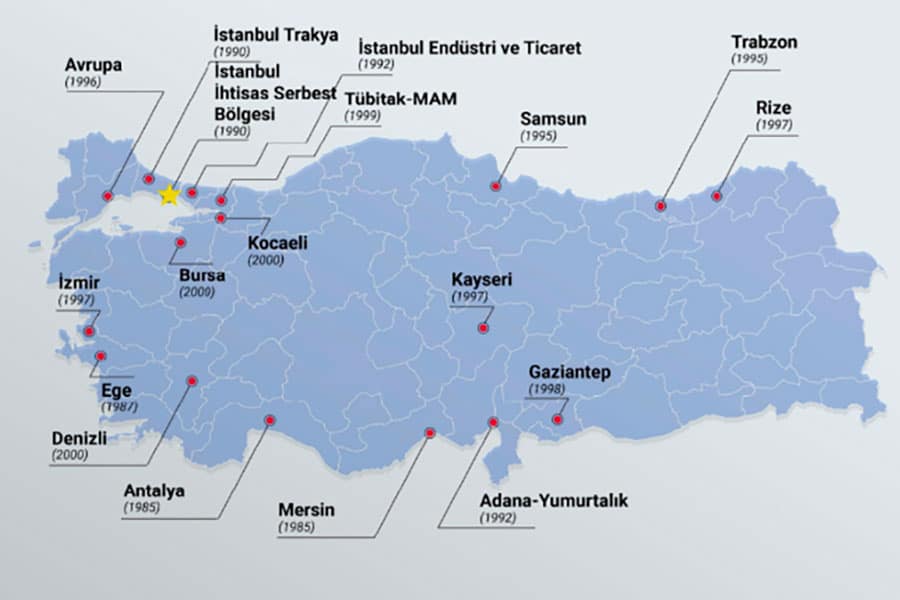Summary
In Turkey, individuals pay an income tax on a progressive scale of 15 to 40% and are entitled to tax deductions.
Companies do not pay a corporate tax if registered in one of Turkey’s eighteen economic free zones. There are also reduced VAT rates of 1 and 8%.
Who pays Turkish taxes?
The residency criterion is the key point for taxes in Turkey. Residents are taxed on their global income, whereas non-residents are taxed on Turkish-sourced earnings only.
Tax residents . Individuals become Turkish tax residents if they reside in Turkey for more than six months in one calendar year. But there are some exceptions. Foreigners who stay in Turkey for six months or more for employment, business, study, or treatment are treated as tax non-residents.
Companies become Turkish tax residents if their registered head office is in Turkey or the centre of all their business transactions is in Turkey.
Tax non-residents can be individuals who spend less than six months in one calendar year in Turkey and get income from Turkey. Legal entities are also considered non‑residents if their income source is in Turkey, but their head office is registered in another country.
Taxes for individuals
There are no national wealth taxes in Turkey. However, Turkish tax residents and non‑residents pay the following types of taxes:
-
a personal income tax;
-
social security contributions;
-
unemployment insurance;
-
dividends and interests tax;
-
inheritance and gift taxes.
Personal income tax (PIT) is the central tax for individuals in Turkey and is regulated by Law No.193, Official Gazette No. 10700 dated 06.01.1961.
PIT is levied on different types of individual income: from employment to nonrecurring income.
Subjects to income tax in Turkey
PIT is charged at a progressive scale of 15 to 40% after certain deductions and allowances.
The PIT rate depends on the annual income amount. The maximum rate will be set if the income for the year exceeds TRY 880,000, which is about $49,000.
Salary and income tax rates in Turkey
In September 2022, the value of 1 US dollar is 18 Turkish Liras (TRY). Check exchange rates for today
Social security contributions are calculated on salary limits of a minimum of TRY 166 and a maximum of TRY 1,251 per day and must be paid by the employer and the employee. The general rates are 20.5% for the employer and 14% for the employee.
Foreign nationals who remain under the protection of their country’s social security system are not required to pay Turkish social security contributions for three months. If there is a treaty between their country of origin and Turkey, the exemption period may be longer.
Foreign workers pay total contributions if they are not subject to foreign social security.
Unemployment insurance contributions are calculated over an upper earnings level of TRY 1,251 per day. The contributions are paid by the employer, employee, and the state, where for an employer, the rate is 2% and for the remaining two is 1%.
Interest tax is 0 to 15%, while non-resident investors always pay it at the maximum rate. In other cases, the tax rate depends on the maturity of bonds and deposits: the longer the maturity, the lower the interest.
Dividends tax is 10%, which is charged only on half of the dividends total. If the income from dividends and income from other sources of an individual exceeds TRY 70,000, or about $4,000, they are included in the annual tax return. In some cases, tax on dividends may be credited against calculated income tax.
Inheritance and gift taxes rates depend on the object cost. The inheritance tax rate ranges from 1 to 30% and from 1 to 10% for gift tax.
Inheritance and gift taxes are paid over three years. Except for lottery prizes, the relevant taxes are collected by withholding at the time of payment.
Tax deductions for individuals
For individual employees, no deductions are permitted. But contributions to social security may be deducted.
The annual cumulative amount of personal deductions cannot exceed the minimum yearly gross salary.
Deductions for Turkish taxpayers
Business tax rates in Turkey
The main taxes for companies in Turkey are taxes on corporate income and a value‑added tax. Also, companies pay banking and insurance transactions tax, digital service tax, special consumption tax, and social security contributions.
Corporate income tax is levied on the income and earnings derived by corporations and corporate bodies such as:
-
capital companies and similar foreign companies;
-
cooperatives;
-
public enterprises;
-
enterprises owned by foundations and associations;
-
joint ventures.
The taxed net corporate income is defined as the difference between the net worth of assets owned at the beginning and the end of the financial year.
The tax on profit is paid at a standard rate of 20%. However, the rate has temporarily increased to 25% for income received in 2021 and 23% for income received in 2022. The current rate will return to 20% from 2023 if the legislation is not changed. The income tax rate for companies in the financial sector is 25%.
The standard value-added tax (VAT) rate is 18%. For comparison, the average base VAT rate in the European Union is 23.1%. VAT is levied if a company provides services, exports and imports goods.
Also, there are reduced VAT rates of 1 and 8% that are valid for some deliveries and services in Turkey.
Reduced VAT rates for deliveries and services in Turkey
The transactions of banks and insurance companies are exempt from VAT but are subject to banking and insurance transactions tax (BITT).
Transactions carried out by licensed banks and insurance companies are subject to BITT at a rate of 5%. But some transactions are subject to 1% or 0% BITT — the rate depends on corporations’ profit from their trades.
The digital service tax rate is 7.5%. The taxpayer of the DST is a digital service provider. For example, in the digital environment, sales of any audible, visual or digital content like computer programs, applications, music, video, games, and in-game applications.
Special consumption tax is levied only once at one stage of the consumption process of four main product groups:
-
petroleum products, natural gas, lubricating oil, solvents, and derivatives of solvent;
-
land, air and sea vehicles;
-
alcoholic beverages and cola soda pops, cigarettes and other tobacco products;
-
luxury products, such as caviar, furs, mobile phones, etc.
The tax amount is defined by the kilogram, litre, cubic metre, or other goods’ units.
Social security contributions for both employer and employee are 34.5% of the employee's salary: 14% for the employee and 20.5% for the employer.
The unemployment contribution of 3% of wages is paid in addition to social security contributions: 1% for the employee and 2% for the employer.
Tax benefits for businesses in Turkey
Turkey has eighteen free zones with a special tax regime. Thus, the government stimulates the development of industry and trade.
The advantages of free economic zones in Turkey are:
-
no income and corporate tax;
-
no stamp duty;
-
no real estate and property taxes;
-
no VAT on logistics services supplied to third countries.
To work in the free zones of Turkey, individuals and legal entities receive a license from the Ministry of Commerce of Turkey. Permitted activities include production, storage and packaging of goods, research, trade, banking and insurance, and software development.

The free zones are located near major Turkish ports along the Black, Aegean and Mediterranean Seas. This location provides quick access to major international trade routes. Source: Turkish Ministry of Trade
Property taxes in Turkey
Taxes and government fees are related to buying, owning and selling real estate. The tax base is the cadastral value, which is usually indicated in the certificate of ownership, TAPU.
Buying real estate in Turkey comes with a property transfer tax, VAT, stamp duty, and government fees.
The property transfer tax rate is 4%. By law, the buyer and the seller pay it in equal shares of 2% each, but, in practice, the buyer takes over the payment of the total amount of tax.
The VAT rate depends on the housing area:
-
1% — for housing with an area of less than 150 m²;
-
8% — for housing with an area of more than 150 m²;
-
18% — for commercial properties.
Foreigners are exempt from paying VAT when buying real estate from a developer. After the transaction is concluded, buyers have the right to apply for a tax deduction, while they have to keep the object in the property for at least one year after receiving the TAPU.
Stamp duty is paid upon signing real estate purchase and sale contracts in the amount of 0.1 to 0.6%, depending on the property value.
The state duty for issuing TAPU — Döner Sermaye — is $130 for non-residents of Turkey and $45 for residents. It is paid at the Cadastral Chamber upon receipt of a certificate of ownership.
Taxes and fees when buying property in Turkey
Real estate ownership tax is paid at a rate of 0.1 to 0.6%, depending on the property type and location.
The increased rate is valid for properties in major cities such as Ankara, Istanbul, Trabzon, Bursa, and Izmir.
The annual property tax in Turkey
Tax on the sale of real estate. Individuals pay a tax on the sale of real estate if they have owned the property for less than five years. The tax is paid on the difference between the cadastral property value specified in the TAPU and the market value at the time of the transaction. The rate varies from 15 to 35%.
A legal entity pays a tax of 23% when selling a property in Turkey.
Tax rates on the sale of real estate in Turkey
Tax rate for legal entities - 23%. In September 2022, the value of 1 US dollar is 18 Turkish Liras (TRY). Check exchange rates for today
Tax on rental income . Individuals do not pay tax on income received from the rental of real estate if it does not exceed TRY 6,600 per year for residential properties and TRY 49,000 for commercial properties. In other cases, the tax is calculated on a progressive scale of 15 to 40%.
Legal entities pay the tax on income from real estate rental at a rate of 23%.
High-value residence tax applies to Turkish real estate worth over TRY 5,000,000 or about $275,070. The tax rates vary between 0.3 to 1%, depending on the value of the real estate.
Examples of properties in Turkey
How to file taxes in Turkey
Paying taxes in Turkey is a two-step process:
-
Registering for the tax on the Turkish Revenue Administration website.
-
Filing tax returns on time.
Registering on the website requires a tax number from a home country and all business details like the phone, email, and address.
Filing tax returns differs and depends on the tax type and payment deadlines. For example, for legal entities, the last payment date of the corporate income tax payment is the 30th day of the fourth month following the fiscal year-end. The Turkish tax year is a calendar year.
Individuals. The income tax is withheld monthly from wages paid through the Turkish Payroll under the Pay As You Earn (PAYE) system.
The filing tax on any outstanding obligation following the above principles is payable in two equal instalments at the time of filing and within the fourth month. Non‑residents leaving Turkey must pay full liability within 15 days before departure.
Taxpayers filing income tax returns for their commercial or professional income must pay an advance income tax. A so-called ‘temporary tax’ is calculated as 15% of their gross income at the end of each quarter during the calendar year.
This tax is submitted before the 17th day of the second month following the end of the respective quarter and must be paid before the 17th day of the submission. The tax paid in advance is credited against the amount of income tax calculated in the annual tax return for the same year.
Legal entities. A self-assessment system is used in Turkey.
Residents and non-residents with a permanent establishment in Turkey are required to register for all taxes in Turkey and file annual income tax returns.
The last date of submission of the CIT return is the 30th day of the fourth month following the fiscal year-end. This date will be 30 April if CIT returns are filed on a calendar-year basis.
The taxable income is declared quarterly as an advance tax on the 17th day of the second month following each quarter, and corresponding taxes are payable on the 17th day of the same period. The advance CIT paid is offset against the final CIT calculated in the annual CIT return.
The last payment date of CIT is the 30th day of the fourth month following the fiscal year-end.
Rates and due dates for filing taxes in Turkey
How not to pay taxes in two countries
Turkey has valid double tax treaties (DTTs) with 85 countries. Individuals and companies can apply for a tax deduction and not pay taxes on the same income twice.
The withholding tax is counted as a tax paid in the country of tax residence.
Countries with double tax treaties with Turkey
Albania,
Algeria,
Australia,
Austria,
Azerbaijan,
Bahrain,
Bangladesh,
Belarus,
Belgium,
Bosnia and Herzegovina,
Brazil,
Bulgaria,
Canada,
China,
Croatia,
Cyprus,
Czech,
Denmark,
Egypt,
Estonia,
Ethiopia,
Finland,
France,
Gambia,
Georgia,
Germany,
Great Britain,
Greece,
Hungary,
India,
Indonesia,
Iran,
Ireland,
Israel,
Italy,
Ivory Coast,
Japan,
Jordan,
Kazakhstan,
Kuwait,
Kyrgyzstan,
Latvia,
Lebanon,
Lithuania,
Luxembourg,
Malaysia,
Malta,
Mexico,
Moldova,
Mongolia,
Montenegro,
Morocco,
Netherlands,
New Zealand,
North Macedonia,
Norway,
Oman,
Pakistan,
Philippines,
Poland,
Portugal,
Qatar,
Romania,
Russia,
Rwanda,
Saudi Arabia,
Singapore,
Slovakia,
South Africa,
Spain,
Sudan,
Sweden,
Switzerland,
Syria,
Tajikistan,
Thailand,
The Republic of Korea,
Tunisia,
Turkmenistan,
UAE,
Ukraine,
USA,
Uzbekistan,
Vietnam,
Yemen.
How to live in Turkey legally to become a country’s taxpayer
A regular tourist visa does not allow you to spend more than six months a year in Turkey. To live in the country, you need a residence permit, permanent residence or citizenship.
The Turkey citizenship by investment program allows investors to get Turkish passports in 6—8 months. Family members such as spouses and children can get second citizenship in Turkey along with the investor.
By investing $400,000+ in the country’s economy, cosmopolitans get Turkey citizenship. There are five investment options available:
-
real estate purchasing for $400,000;
-
business investment — from $500,000;
-
opening a bank deposit — from $500,000;
-
buying government bonds — from $500,000;
-
buying shares of investment funds — from $500,000.
The purchase of real estate is the most demanded option. Investors can return the money they invested into real estate three years after obtaining Turkish citizenship.
Real estate prices grow by 15 to 25% per year, and rental income reaches 15% per annum in Turkey. It means that an investor will receive additional profit by renting out the objects for three years and then when selling the property.
Immigrant Invest is a licensed agent for citizenship and residence by investment programs in the EU, the Caribbean, Asia, and the Middle East. Take advantage of our global 15-year expertise — schedule a meeting with our investment programs experts.













